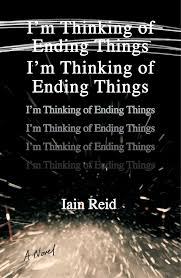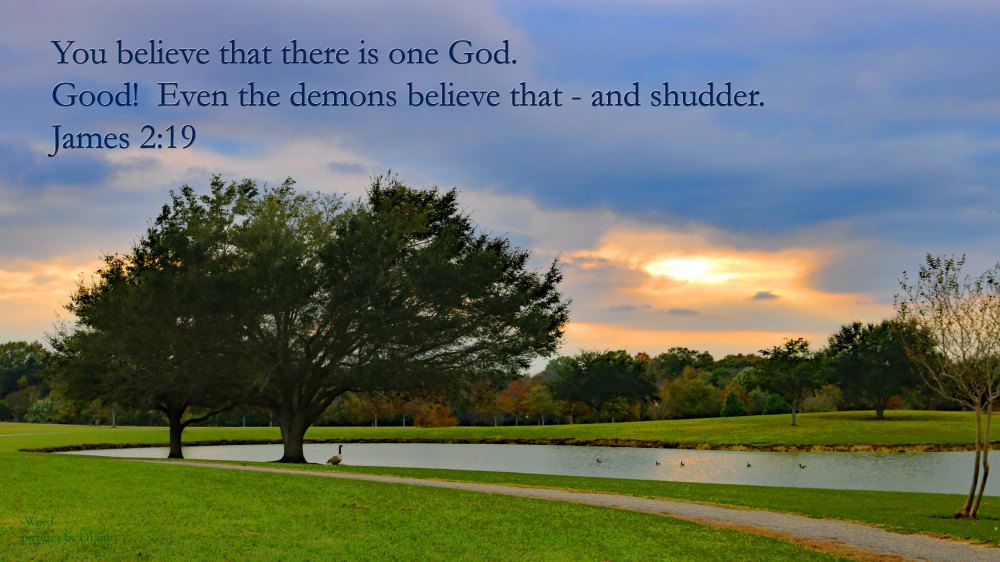Last time, I nerded out a little, and then we covered the first portion of A Passion Play, the prog rock concept album by Jethro Tull. Here’s part two, in which we meet the devil himself.
Critique Oblique
Here the dead man is quizzed and battered, treated more like an actor right now than an actor in the past. He can’t speak, he can’t think. We learn that his sister lost her virginity while in school, which I guess is bad or something? It seems to indicate that the dead man lost contact with his family early and wasn’t involved in their affairs. But in the end the employees are kind: “Well you’re for us and we’re for you.” The Passion Play itself refers to the passion of Christ, in which he died and was reborn. The most traditional versions of the story don’t really talk about Christ’s resurrection, actually. It’s all about the suffering. And here, the dead man suffers visions of his own spiritually destitute life. “Are we here… for the gory satisfaction of telling you how absolutely awful you really are?”
7 of Cups
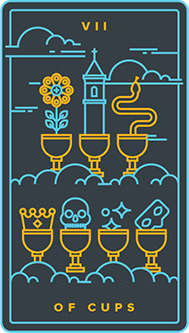
This is typically a pretty positive card, but look at the skull and snake. Cups are about emotion, and the sevens are about “victory.” In the case of our dead man, though, victory would be understanding his life clearly. The cups all represent different visions, different possibilities. Here, the dead man sees them all, sees everything laid out before him. The “examining body” is, of course, three things at once: the dead man’s sister’s teachers, the salacious men who “examined” her body, and the angels examining the dead man’s body of work.
Forest Dance #1
The play hushes again. The first act is over. The second act is, well, kind of weird. Even for this narrative. But here we can hear heartbeats again, throbbing on a string rather than a drum, which would be more traditional. The light, sprightly music seems to offer some hope to things. Certainly the title, “Forest dance,” is bright and happy. We’ll see in a moment what that’s actually referring to. But first!
The Sun
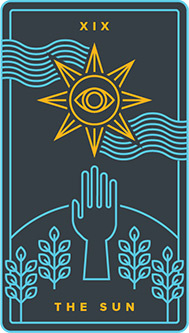
If everything has been in the dark until now — the funeral, the rain, the darkness of death, the darkness of the theater — the sun has come out for a moment now. We see things clearly in the sun. It’s associated with Apollo, the god of reason. The dead man gets it now. The intermission, beginning here and ending in two more tracks, allows us to get it, as well. Though it’s going to be a weird trip in juuuust a second.
The Story of the Hare Who Lost His Spectacles
What did I tell you? Contextually, this is not actually that weird. It’s the comic intermission in a tragedy, which is a thing that traditional plays did all the time. Anderson has sworn up and down that he didn’t study all the things people think he studied. This album, particularly, usually get people thinking he’s carefully read The Inferno and Paradise Lost, as well as medieval passion plays. At one time he said none of that was true. Of course, he’s had plenty of time since, so I’m not claiming he hasn’t read those, only that at one time he said that. But, really, a lot of traditional folk plays use the same structure, so this weird, traditionally, Winnie-the-Pooh-ish story about dumb animals goofing around makes sense in that way. It’s also got tons of puns, like “owl SCOWLing” and “you CAN, GURU, you can.” What’s the point? It’s about blindness, and people not noticing because they’re so caught up in their own goofy problems. Their suggestions are all useless. And, in the end, they miss the obvious, that hare has extra glasses.
Death
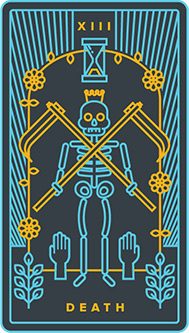
What a time to get the Death card. This song is the only song that doesn’t have anything to do with it! But it exemplifies, I think, that particular kind of post-war British malaise that so many artists dealt with. (see Pink Floyd). So the characters are caricatures of the sort of idiots ruining the world. They’re causing the world to die out, to lose its light and its joy. The world they made led to people like the dead man, because they had no outlets but competition. This may end up being the most important card we get, because it reminds us what the stakes are for the album, rather than the man’s life. The man is dead, so his race is run (for the most part). We’re still alive. We have to learn from the dead man how to live our lives, to actually be alive.
Forest Dance #2
More instrumental music, carrying us out of the intermission and back into the play proper. It’s similar to the first Forest Dance, though maybe it’s even more energetic.
King of Cups

The king still represents outward-looking power, and here the king of the sea poses before a peaceful yacht. Our emotions are running high now, as the song carries us back to the problem itself. Once you’re sure about something, you can turn outward and project that calm determination to others. As we’re about to see, that’s what the dead man has done.
The Foot of Our Stairs
This song is almost painfully sensory. This is Anderson at his lyrical best, as in “Mother Goose.” It puts us in a state of mind, only to begin the theological questioning that makes up the last half of Aqualung. It seems Tull liked to sucker listeners in by making the back half of the album question all the assumptions the first half trafficked in, even satirically.
One of the most startling things in this song, and maybe the album, is the line “God of ages / lord of time / minus the right / to be wrong.” God can’t be wrong. It’s in the definition, at least theoretically. And usually, we either think of humans as being wrong or God being right. But we never think of God being unable to be wrong. It’s impossible. What kind of life is that?
The song is depicting the moment the dead man turns towards Hell, of course.
6 of Wands

The knight on his horse is victorious, returning from some triumph. The wands in the background fly banners. The knight rides forward, wand upright. Wands are about passion, and it seems that the dead man is finding a passion here. He chooses to go into Hell, in a way he hasn’t really chosen anything before.
Overseer Overture
The staff aren’t happy about it. They accept his decision, but are melancholy. The dead man loses his hate and does “as the loving heathen do.” What could that be? I’m genuinely unsure at this moment. The song picks up in tempo and we get a “Devil talks to us” song that I like better than “Sympathy for the Devil.” We learn that Lucifer knows Heaven was better, that he has, accidentally, provided help to humans. That always leads me to believe that Lucifer, here, is the actual “God” that people have been interacting with. I thought this long before I ever encountered Gnosticism. Lucifer doesn’t want to be here, doing this, and he doesn’t want to help anyone. But he doesn’t deny it either. He references Maypole dancing, and in one sense Lucifer is the entity that gave sexuality to humans.
This song makes Lucifer seem more sympathetic (ha!) than we might expect, but not in that full-on Romantic, Byronic sense. It really comes paid in the following songs.
Queen of Cups
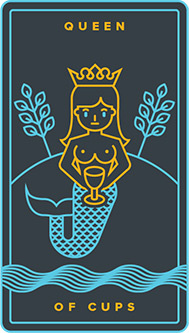
The queens have internal mastery of their suit, and help to give others similar mastery. They don’t change anything around them, but they can change themselves. Here, the queen is afloat in a sea before a fruitful hill. I think this image is twinned in the song. The dead man is gaining this kind of emotional balance. He smiles as he trudges into Hell. Lucifer, too, is happier than he says, I think. He is glad to have contributed something, but he does not act directly. That’s God’s job. Lucifer is the “father of lies,” after all. If he contributes something to humanity, it has to be indirectly, from a distance. He tricks us into growing. As he does, here, with the dead man. Of course, we can’t really know if the dead man is doing what Lucifer wants, but he does seem to pepper this song with conflicting ideas. He’s an overseer one can summon, a jail guard presiding over Maypole dances and harvests.
10.08 to Paddington
A short, gentle instrumental. Maybe it depicts the dead man’s tenure in Hell. Not much happens, but not much needs to.
2 of Cups
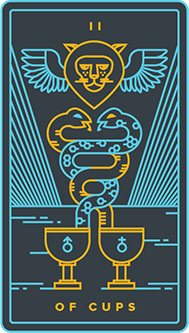
This is the quiet moment the dead man needed. Hell may be barren, but it is, in this case, the barrenness of the field that is to be sowed with seed. The two snakes here twine together, bringing emotional balance again. That’s what the winged lion is representing — a third rising up out of the conjoining of two. It’s the new idea, the strong feeling, that leads us through a hard time in life. The twos are about finding balance, not having it already. The dead man is almost there.
Flight from Lucifer
The song’s initial sounds are very prog rock, and they are interrupted by a squeal and a heavier beat. The dead man recoils from Lucifer, who is too cold. Lucifer posed, and to some degree is, bad, in the way crops and temptation and love and hate are bad. They’re perfectly natural, but not always great. On the other hand, God is good, in the way that life and birth and the sun are. That goodness doesn’t mean anything.
“Here’s the everlasting rub
neither am I good nor bad
I’d give up my halo for a horn
and the horn for the hat I once had”
Humans aren’t those things! They’re not good or bad. They’re humans! “Everyone’s saved, we’re in the grave!” Humans live and die. That’s what’s true about us. Religion’s badgering about invisible morality — proven in some way true by the experiences of the dead man — are still wrong, because they’re the same rat race that the dead man engaged in as a businessman. What’s the point? The dead man longs for simple days, a hat, and his old shoes. They’re the symbols of his lost humanity. “A little of what you fancy does you good, or so it should.” There’s no point in the extremes.
This song, by the way, along with the next, are definitely my favorites to listen to loud enough so I can sing along.
7 of Wands
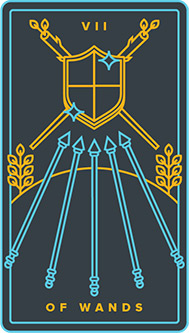
Passion! Success! Defense! Notice the shield? The dead man made his choice, back with the 6 of Wands. So here, in the next card, he’s following it to its conclusion, shoring up his defenses. He’s making sure he gets away from the temptation of Lucifer in the way he now understands he needs to be away from the temptation of God.
Magus Perde
This jangly, crazy conclusion is the best. I’ll do my best not to just put the lyrics here.
“Hail son of kings! Make the ever-dying sign. / Cross your fingers in the sky for those about to be!” The dead man is a Christ figure, which we knew all along. But that means he has to harrow Hell. He has to break the doors down and leave them rent forever. He speaks here as a wizard, a “voyager into life” who “treads the knife’s edge.” He calls the devil and the lord here, as Lucifer said he could. Now that he can invoke both, he can summon the dead and release them back into life. And that’s what the “loving heathen” did. They reincarnated. They didn’t suffer eternally in the afterlife. They lived and they lived again. Most of the evidence points to western European cultures, particularly the various Celtic cultures, believing in reincarnation of some sort. The dead man “rolls the stone away / from the dark into ever-day.” He rescues himself, but in some way he rescues us all.
5 of Wands
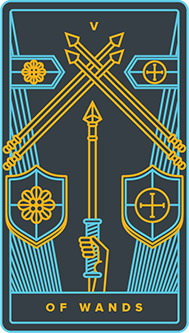
Now we go backward in the suit. The fives are about conflict. How else would conflict happen in the Wands except in the passions, on the ethereal planes? This card, here, is the wizard’s battle, the blow that the dead man strikes for humanity against the gatekeepers, good and evil both. In the Waite-Smith this card is just a bunch of guys beating the shit out of each other. It’s conflict, and conflict that raises us up in the end. If we can make it through.
Epilogue
Instead of a hush, there’s a rush on the dead man’s road. A life enters the “ever passion play.” Do you remember the album cover, from last time? You can go back and look at it real quick, I’ll still be here.
That is a dead ballerina. Now look at the header for this post again. That is a living ballerina. The first image is the cover of the album, and the second image is the back matter.
Here are both together:
It’s pretty simple, right? And no, I don’t know why Ian Anderson appears to shout “Steve! Caroline!” at the end. Some people think he’s yelling something about Satan, indicating that the dead man didn’t escape. I feel like the cleaned up audio makes it clear that’s not true.
Queen of Pentacles
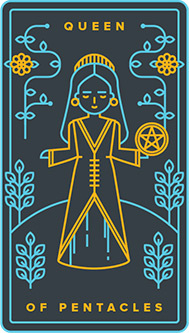
We’ve seen a lot out of the queens in this album. It is all about reflection and learning, isn’t it? The dead man returns to the earth, with insight that he can use to lead a more, well, earthy life. That’s simple too.
~
Really a lot of the stuff I’ve said about this album is not groundbreaking. I can say, though, that pretty much all of it I arrived at personally. I have just listened to this album a lot. It may be responsible for some of my personal beliefs! It goes past that idea that “we’re not all good or all bad.” It dives into the idea that we are neither of those, and shouldn’t be trying to be. They’re foreign notions, unrelated to our lives on this earth, right now. Obviously the sneer in the songs talking about the dead man’s former life tell us that “doing whatever you want” isn’t going to cut it here. But chasing after goodness or evil is the same as chasing after money or power. Stop chasing. Grow, instead.
Advertisements Share this:


